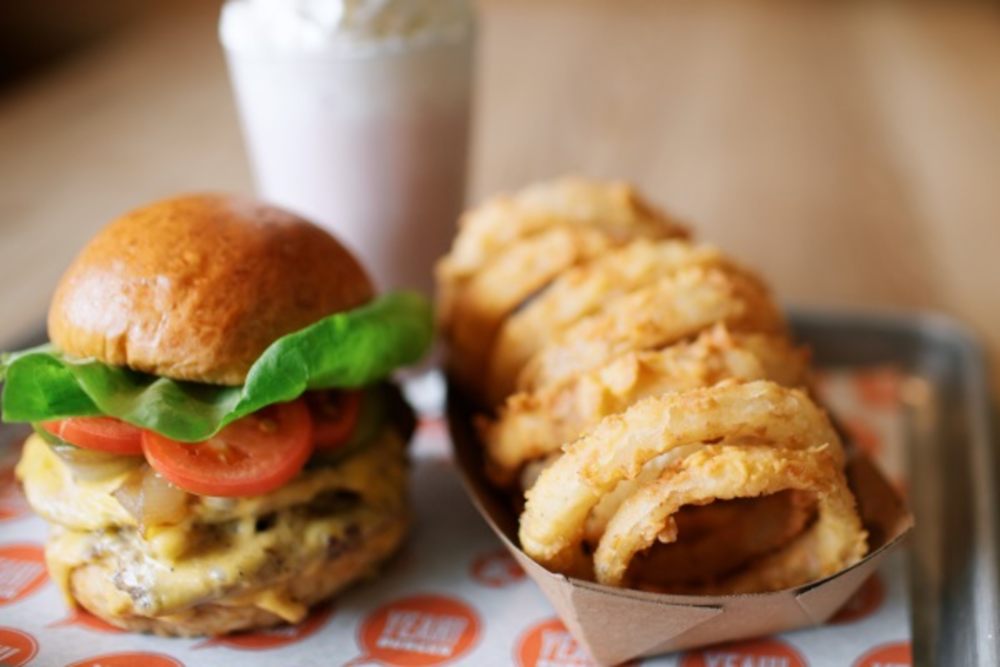The average American eats nearly 150 burgers a year—or about three hamburgers every week. That’s according to a 2012 television report from famed physician Dr. Mehmet Oz.
But now more than ever, shoppers desire food choices—including hamburgers—that fit their health-conscious lifestyles; gluten-free, vegan, organic—you name it. Customers today demand more than just tasty food; they crave eatables that feed their needs and beliefs, as well as their stomachs. In fact, the United States Department of Agriculture reports that demand for organic goods continues to show double-digit growth, with last year’s sales of organic products in the United States reaching an estimated $35 billion.
Marketers at YEAH! BURGER say that they’re satisfying that hunger for organic food, sustainable environments, and responsible practices with its purpose-driven brand. “We have been trying to connect with customers on a deeper level. We’re not just selling a product; we’re selling a lifestyle,” says Kelly Wallace, marketing and business development director for YEAH! BURGER, an eco-friendly, health-conscious burger franchise in the trendy neighborhoods of West Midtown and Virginia Highland in Atlanta. “Connecting with customers on multiple levels, especially with a shared belief system, is the future of marketing,” Wallace says.
(Click photo to enlarge image.)
It’s a branding trend that’s continuing to pick up momentum: A growing number of—and demand for—better burger franchises, including spots like Burger Fi, Burger 21, Start, Shake Shack, (which recently filed for an initial public offering), and of course YEAH! BURGER. Restaurants such as these go beyond healthy food and often consider the physical environment as part of their marketing plans, with reclaimed wood on the walls, unbleached napkins, energy-saving equipment, water-conserving faucets, zero waste baskets, and a plethora of recycling bins. “In every touchpoint that we have, we’re playing into our main philosophy,” Wallace explains. She says that the founder of YEAH! BURGER, Erik Maier, saw a lack of healthy burger franchise options in the Atlanta market, and in 2010 opened his doors with a mission to market wholesome food to an increasingly agile customer base.
“Customers are becoming more educated in every industry, including the restaurant business,” Wallace continues. “Our customers are smart. They want to have the transparency, and the traceability, of the food. And they also hold us accountable; they want to know where we’re sourcing the food from.”
Wallace says an integral part of YEAH! BURGER’s strategy is to market an ethos; it’s a belief system centered on a concern for the welfare of animals, the environment, and of course the health of their customers. “Our main mission is to bring wholesome food to the customers,” Wallace says.
But she warns brand marketers of one inherent challenge for a health-conscious brand: Organic, responsible, and sustainability come at a pricier premium: “I think the biggest challenge is in [customer] education. Of course we’ve seen the exponential growth in the number of people who are educated in the organic food industry; however, we’re just touching the surface. Understanding why [our products and services] cost a higher dollar amount can prove to be a challenge for some. So, we’re constantly trying to educate our customers about that; and we’re doing it through all of these different touchpoints.” Wallace says that despite the price tag challenges, purpose branding is proving profitable for YEAH! BURGER—and its customers. “This ethos is why we’re becoming successful. Year over year, our business is growing; it’s because of this education,” she says. In fact, YEAH! BURGER plans to open more restaurants in Nashville and the Atlanta area beginning this spring.
Wallace insists that purpose marketing is simply branding of the future: “Millennials are, obviously, the future of your customer base. They are so interested in these do-good philosophies. They want to make a difference. The brands that are doing well, right now, are the ones with marketers trying to make a difference. Educate your customers. Give them the ethos that they want. It’s where marketing of the future is going.”








